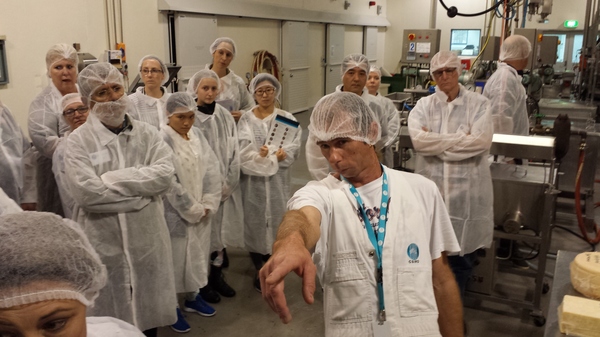CSIRO meat scientists hope to help people live longer by making low-fat hot-dogs … and then they’re finding ways to nourish people when they are old and can’t chew.
Dr Aarti Tobin explained how CSIRO has developed ‘steakettes’ for the geriatric market when she addressed a group of Gippsland food industry representatives
She was among scientists who addressed a group of food industry representatives from the state’s east. The visit, organised by Agribusiness Gippsland, saw more than 30 people go behind the scenes at CSIRO’s Food Innovation Centre in Werribee on 28 April.
The day-long session aimed to introduce Gippsland’s food processors, industry consultants and shire economic development officers to the latest technologies.
The visitors heard from experts researching how to extend the shelf life of foods, how to reduce water and power use in food processing and developing new products from otherwise wasted foods.
The steakettes consist of restructured meat formed into portions through a process called cold-binding, Dr Tobin said.
“The meat is tender, because we’ve got rid of the connective tissue. And we don’t have to cook it for a long time to tenderise it.
“It’s a good way to use lower-value cuts and trimmings. It gives good portion control, it has a longer shelf life and also allows us to fortify the foods if needed.
“The disadvantage is that it has the texture of restructured meat,” she said, but added that it was a more palatable option for geriatric diners, children or people with swallowing difficulties.
The alternative was pulverised, cooked meats which looked unappealing and could be microbiologically risky, she added.
“Nursing homes tend to supply protein that they can afford, which tends to be the cheaper and tougher meats.
“They put that on the plate and it stays there. This product, at least, can be eaten.”
Her team is also investigating using fruit and cereal-based fibres to replace fat in frankfurters. It acts as an effective binder and is four times healthier than fat, she said.
Keen to reduce food nasties, the CSIRO scientists have produced sausages using high-pressure processing (HPP), which cuts cooking loss by 28 per cent and delivers “a better sensory product” Dr Tobin said.
The pilot-scale equipment at Werribee delivers uniform, instantaneous and intense pressure, “about 10 times the pressure you get at the bottom of the ocean.”
But it shortens cooking times and restricts weight loss cooking cheaper cuts, extends shelf life and reduces the use of meat preservatives
HPP-treated meats were given to a chef to trial cooking – resulting in platters of lamb tagine, goat curry and chuck steak tacos.
“He was really impressed because some of those cuts would normally have taken him hours to tenderise,” Dr Tobin told the Gippsland visitors.
Meat boffins give something to chew on

Digital Edition
Subscribe
Get an all ACCESS PASS to the News and your Digital Edition with an online subscription
$4 million Doveton Pool redevelopment underway
The $4 million redevelopment at Doveton Pool began on Tuesday 13 January, with the next phase of construction endeavouring to deliver modern and accessible...







